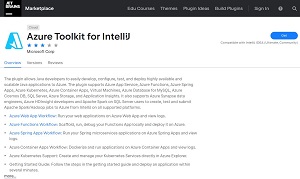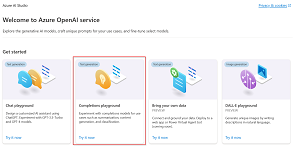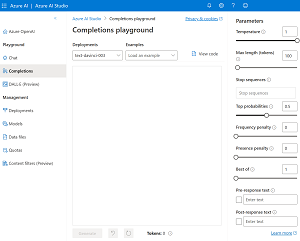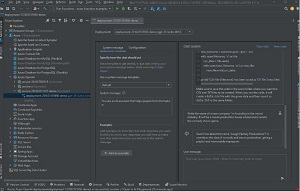News
Azure Java Jockeys Get OpenAI Playground
Microsoft's dev team for Java on Azure tooling announced support for the Azure OpenAI Service and associated Playground, enabling new AI-based scenarios based on advanced tech from Microsoft partner OpenAI, creator of ChatGPT.
Those scenarios are delivered via the team's main offering, the Azure Toolkit for IntelliJ, which is based on the JetBrains IDEA and gets updated monthly. It helps Azure users develop, configure, test and deploy highly available and scalable Java applications to the cloud platform.
 [Click on image for larger view.] Azure Toolkit for IntelliJ (source: JetBrains).
[Click on image for larger view.] Azure Toolkit for IntelliJ (source: JetBrains).
The September 2023 update to the toolkit introduced support for Azure OpenAI Service and Playground, the latter allowing developers to experiment with prompts and settings for various machine language models from OpenAI, including GPT-3, GPT-4 and DALL·E1
"In the latest release, we have added support for Azure Open AI Service and Playground to enable Java developers to try this user-friendly interface in IntelliJ IDEA," Microsoft announced today (Oct. 25), listing these capabilities:
- Create an Azure OpenAI Service: First, devs can create an Azure OpenAI Service in Azure Explorer.
- Deploy a model in Azure OpenAI Studio in IntelliJ IDEA: Devs need to create a deployment which will enable them to make calls against a provided base model or fine-tuned model. Each deployment can be associated with one model.
- Interact with Azure OpenAI using different prompts and settings: In the playground, devs can test deployments with different prompts and also tailor the model to different use cases by adjusting some parameters/settings in the configuration tab.
- Generate code samples based on Java SDK, JSON and Curl: Once satisfied with the model and prompts, devs can view code samples based on Java SDK, JSON and Curl for making the API call and integrate them into their own applications.
The Playground is used for the experimentation with different prompts and settings from within Azure OpenAI Studio, which includes playgrounds for chat, completions and the image-generating DALL·E model.
 [Click on image for larger view.] Azure OpenAI Playgrounds (source: Microsoft).
[Click on image for larger view.] Azure OpenAI Playgrounds (source: Microsoft).
The completions Playground, for example, is simply a text box where developers can submit a prompt to generate a completion and then quickly iterate and experiment with various capabilities.
 [Click on image for larger view.] Completions Playground (source: Microsoft).
[Click on image for larger view.] Completions Playground (source: Microsoft).
"In the playground, you can test your deployments with different prompts," Microsoft said. "You can also tailor the model to different use cases by adjusting some parameters/settings in the configuration tab." That's illustrated in this animated GIF:
 [Click on image for larger, animated GIF view.] Playground in Animated Action (source: Microsoft).
[Click on image for larger, animated GIF view.] Playground in Animated Action (source: Microsoft).
The dev team also updated the Azure Toolkit for Eclipse, adding support for the latest Eclipse version (4.29) while also making some UI enhancements and improving the service creation experience, such as updating the default runtime stack versions.
About the Author
David Ramel is an editor and writer at Converge 360.